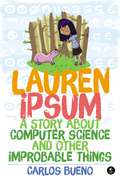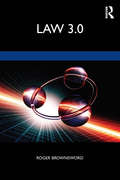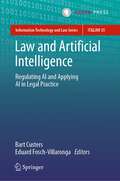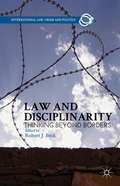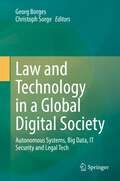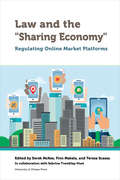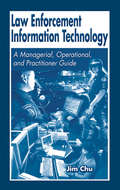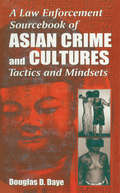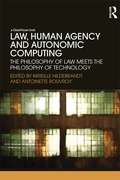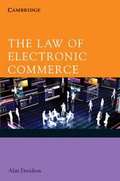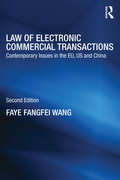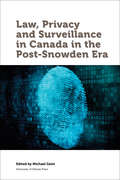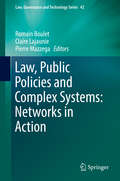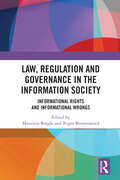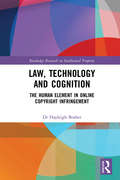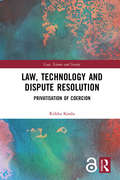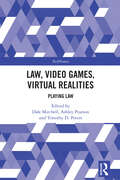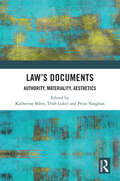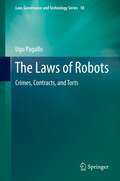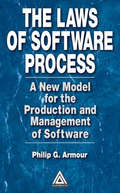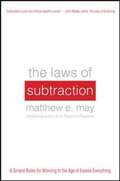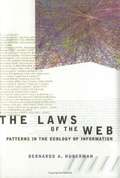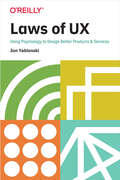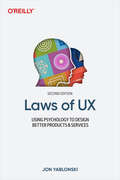- Table View
- List View
Lauren Ipsum: A Story About Computer Science and Other Improbable Things
by Carlos BuenoLauren Ipsum is a whimsical journey through a land where logic and computer science come to life.Meet Lauren, an adventurer lost in Userland who needs to find her way home by solving a series of puzzles. As she visits places like the Push & Pop Café and makes friends with people like Hugh Rustic and the Wandering Salesman, Lauren learns about computer science without even realizing it—and so do you!Read Lauren Ipsum yourself or with someone littler than you, then flip to the notes at the back of the book to learn more about logic and computer science in the real world.Suggested for ages 10+
Law 3.0: Rules, Regulation, and Technology
by Roger BrownswordPutting technology front and centre in our thinking about law, this book introduces Law 3.0: the future of the legal landscape. Technology not only disrupts the traditional idea of what it is ‘to think like a lawyer,’ as per Law 1.0; it presents major challenges to regulators who are reasoning in a Law 2.0 mode. As this book demonstrates, the latest developments in technology offer regulators the possibility of employing a technical fix rather than just relying on rules – thus, we are introducing Law 3.0. Law 3.0 represents, so to speak, the state we are in and the conversation that we now need to have, and this book identifies some of the key points for discussion in that conversation. Thinking like a lawyer might continue to be associated with Law 1.0, but from 2020 onward, Law 3.0 is the conversation that we all need to join. And, as this book argues, law and the evolution of legal reasoning cannot be adequately understood unless we grasp the significance of technology in shaping both legal doctrine and our regulatory thinking. This is a book for those studying, or about to study, law – as well as others with interests in the legal, political, and social impact of technology.
Law and Artificial Intelligence: Regulating AI and Applying AI in Legal Practice (Information Technology and Law Series #35)
by Bart Custers Eduard Fosch-VillarongaThis book provides an in-depth overview of what is currently happening in the field of Law and Artificial Intelligence (AI). From deep fakes and disinformation to killer robots, surgical robots, and AI lawmaking, the many and varied contributors to this volume discuss how AI could and should be regulated in the areas of public law, including constitutional law, human rights law, criminal law, and tax law, as well as areas of private law, including liability law, competition law, and consumer law. Aimed at an audience without a background in technology, this book covers how AI changes these areas of law as well as legal practice itself. This scholarship should prove of value to academics in several disciplines (e.g., law, ethics, sociology, politics, and public administration) and those who may find themselves confronted with AI in the course of their work, particularly people working within the legal domain (e.g., lawyers, judges, law enforcement officers, public prosecutors, lawmakers, and policy advisors).Bart Custers is Professor of Law and Data Science at eLaw - Center for Law and Digital Technologies at Leiden University in the Netherlands.Eduard Fosch-Villaronga is Assistant Professor at eLaw - Center for Law and Digital Technologies at Leiden University in the Netherlands.
Law And Disciplinarity
by Robert J. BeckIn the twenty-first century, traditional legal borders both geographic and intellectual have been increasingly contested. Many observers have questioned whether the long-held conceptions of sovereign state boundaries remain salient in a world of technology-accelerated transnational flows of people, capital, and information. Meanwhile, scholars across the social sciences and humanities have begun crossing disciplinary borders in unprecedented ways, co-opting new methodologies and engaging in meaningful and sustained dialogue about the meaning of law in its changing global context. These emerging movements prompt important questions: what are the nature and implications of shifting legal borders? What does the future hold for them? What role do new technologies play in this evolving story? Law and Disciplinarity: Thinking beyond Borders sets forth to answer these questions by way of distinguished scholars drawn from across a wide range of disciplines, including law, political science, international relations, and communications. "
Law and Technology in a Global Digital Society: Autonomous Systems, Big Data, IT Security and Legal Tech
by Georg Borges Christoph SorgeThis book examines central aspects of the new technologies and the legal questions raised by them from both an international and an inter-disciplinary perspective. The technology revolution and the global networking of IT systems pose enormous challenges for the law. Current areas of discussion relate to autonomous systems, big data and issues surrounding legal tech. Ensuring data protection and IT security as well as the creation of a legal framework for the new technology as a whole can only be achieved through international and inter-disciplinary co-operation.The team of authors is made up of experienced, internationally renowned experts as well as young researchers and professionals who give valuable insights from numerous different jurisdictions. This book is written for jurists and those responsible for technology in public authorities and companies as well as practising lawyers and researchers.
Law and the "Sharing Economy": Regulating Online Market Platforms (Law, Technology and Media)
by Harry Arthurs Francesco Ducci Marie-Cécile Escande-Varniol Vincent Gautrais Michael Geist Eran Kaplinsky Nofar Sheffi Sabrina Tremblay-Huet Eric Tucker Mariana ValverdeControversy shrouds sharing economy platforms. It stems partially from the platforms’ economic impact, which is felt most acutely in certain sectors: Uber drivers compete with taxi drivers; Airbnb hosts compete with hotels. Other consequences lie elsewhere: Uber is associated with a trend toward low-paying, precarious work, whereas Airbnb is accused of exacerbating real estate speculation and raising the cost of long-term rental housing. While governments in some jurisdictions have attempted to rein in the platforms, technology has enabled such companies to bypass conventional regulatory categories, generating accusations of “unfair competition” as well as debates about the merits of existing regulatory regimes. Indeed, the platforms blur a number of familiar distinctions, including personal versus commercial activity; infrastructure versus content; contractual autonomy versus hierarchical control. These ambiguities can stymie legal regimes that rely on these distinctions as organizing principles, including those relating to labour, competition, tax, insurance, information, the prohibition of discrimination, as well as specialized sectoral regulation. This book is organized around five themes: technologies of regulation; regulating technology; the sites of regulation (local to global); regulating markets; and regulating labour. Together, the chapters offer a rich variety of insights on the regulation of the sharing economy, both in terms of the traditional areas of law they bring to bear, and the theoretical perspectives that inform their analysis. Published in English.
Law Enforcement Information Technology: A Managerial, Operational, and Practitioner Guide
by James ChuARE YOU PREPARED FOR THE LAW ENFORCEMENT IT REVOLUTION? Law enforcement agencies that are laggards in Information Technology (IT) will soon, if not already, be considered mismanaged. Whether you are in an operational position, or you are a police officer who aspires to a higher rank, you must be aware of how IT can help you perform your job and hel
A Law Enforcement Sourcebook of Asian Crime and CulturesTactics and Mindsets
by Douglas D. DayeEven in multicultural North America, few whites, blacks, or Hispanics have extensive experience or understanding of Asian culture. For experienced police officers, intelligence analysts, correctional officers, and prosecutors, the problems of cultural differences in behavior remain complex and problematic. This book addresses these specific law enforcement problems, and supplies law enforcement professionals with information and strategies for easier arrests, more accurate intelligence, more successful prosecutions, and fewer problems during incarceration.
Law, Human Agency and Autonomic Computing: The Philosophy of Law Meets the Philosophy of Technology
by Mireille Hildebrandt Antoinette RouvroyLaw, Human Agency and Autonomic Computing interrogates the legal implications of the notion and experience of human agency implied by the emerging paradigm of autonomic computing, and the socio-technical infrastructures it supports. The development of autonomic computing and ambient intelligence – self-governing systems – challenge traditional philosophical conceptions of human self-constitution and agency, with significant consequences for the theory and practice of constitutional self-government. Ideas of identity, subjectivity, agency, personhood, intentionality, and embodiment are all central to the functioning of modern legal systems. But once artificial entities become more autonomic, and less dependent on deliberate human intervention, criteria like agency, intentionality and self-determination, become too fragile to serve as defining criteria for human subjectivity, personality or identity, and for characterizing the processes through which individual citizens become moral and legal subjects. Are autonomic – yet artificial – systems shrinking the distance between (acting) subjects and (acted upon) objects? How ‘distinctively human’ will agency be in a world of autonomic computing? Or, alternatively, does autonomic computing merely disclose that we were never, in this sense, ‘human’ anyway? A dialogue between philosophers of technology and philosophers of law, this book addresses these questions, as it takes up the unprecedented opportunity that autonomic computing and ambient intelligence offer for a reassessment of the most basic concepts of law.
The Law of Electronic Commerce
by Alan DavidsonWritten specifically for legal practitioners and students, this book examines the concerns, laws and regulations involved in Electronic Commerce. In just a few years, commerce via the World Wide Web and other online platforms has boomed, and a new field of legal theory and practice has emerged. Legislation has been enacted to keep pace with commercial realities, cyber-criminals and unforeseen social consequences, but the ever-evolving nature of new technologies has challenged the capacity of the courts to respond effectively. This book addresses the legal issues relating to the introduction and adoption of various forms of electronic commerce. From intellectual property, to issues of security and privacy, Alan Davidson looks at the practical changes for lawyers and commercial parties whilst providing a rationale for the underlying legal theory.
Law of Electronic Commercial Transactions: Contemporary Issues in the EU, US and China (Routledge Research in Information Technology and E-Commerce Law)
by Faye Fangfei WangThe development of new technologies places new challenges to the interpretation and implementation of legislation in the information society. The recent deployment of service-oriented computing and cloud computing for online commercial activities has urged countries to amend existing legislation and launch new regulations. With the exponential growth of international electronic commercial transactions, a consistent global standard of regulating the legal effects of electronic communications, the protection of data privacy security and the effectiveness of Internet-related dispute resolution are motivating factors to build users’ trust and confidence in conducting cross-border business and their sharing information online. The second edition of this book continues taking a ‘solutions to obstacles’ approach and analyses the main legal obstacles to the establishment of trust and confidence in undertaking business online. In comparing the legislative frameworks of e-commerce in the EU, US, China and International Organisations, the book sets out solutions to modernise and harmonise laws at the national, regional and international levels in response to current technological developments. It specifically provides information on the key legal challenges caused by the increasing popularity of service-oriented computing and cloud computing as well as the growing number of cross-border transactions and its relation to data privacy protection, Internet jurisdiction, choice of law and online dispute resolution. It considers how greater legal certainty can be achieved in cloud computing service contracts and other agreements resulted in service-oriented computing. The second edition of Law of Electronic Commercial Transactions is a clear and up to date account of a fast-moving area of study. It will be of great value to legislators, politicians, practitioners, scholars, businesses, individuals, postgraduate and undergraduate students. It provides in-depth research into finding solutions to remove eight generic legal obstacles in electronic commercial transactions and offers insights into policy making, law reforms, regulatory developments and self-protection awareness.
Law, Privacy and Surveillance in Canada in the Post-Snowden Era (Law, Technology and Media)
by Michael GeistYears of surveillance-related leaks from US whistleblower Edward Snowden have fuelled an international debate on privacy, spying, and Internet surveillance. Much of the focus has centered on the role of the US National Security Agency, yet there is an important Canadian side to the story. The Communications Security Establishment, the Canadian counterpart to the NSA, has played an active role in surveillance activities both at home and abroad, raising a host of challenging legal and policy questions. With contributions by leading experts in the field, Law, Privacy and Surveillance in Canada in the Post-Snowden Era is the right book at the right time: From the effectiveness of accountability and oversight programs to the legal issues raised by metadata collection to the privacy challenges surrounding new technologies, this book explores current issues torn from the headlines with a uniquely Canadian perspective.
Law, Public Policies and Complex Systems: Networks in Action (Law, Governance and Technology Series #42)
by Claire Lajaunie Romain Boulet Pierre MazzegaThis book investigates how various scientific communities – e.g. legal scientists, political scientists, sociologists, mathematicians, and computer scientists – study law and public policies, which are portrayed here as complex systems. Today, research on law and public policies is rapidly developing at the international level, relying heavily on modeling that employs innovative methods for concrete implementation. Among the subject matter discussed, law as a network of evolving and interactive norms is now a prominent sphere of study. Similarly, public policies are now a topic in their own right, as policy can no longer be examined as a linear process; rather, its study should reflect the complexity of the networks of actors, norms and resources involved, as well as the uncertainty or weak predictability of their direct or indirect impacts. The book is divided into three maain parts: complexity faced by jurists, complexity in action and public policies, and complexity and networks. The main themes examined concern codification, governance, climate change, normative networks, health, water management, use-related conflicts, legal regime conflicts, and the use of indicators.
Law, Regulation and Governance in the Information Society: Informational Rights and Informational Wrongs
by Maurizio Borghi Roger BrownswordThis edited collection seeks to map the landscape of contemporary informational interests, to evaluate a range of recognised and putative rights and wrongs associated with modern information societies, and to consider how law, regulation, and governance should be deployed in response. New technologies and new applications constantly disrupt our values, our framing of our world, and our sense of where we are and who we are. In our ‘information societies’, we entertain mixed hopes and expectations, as well as significant fears and concerns. At the root of these, there are a number of informational interests, on the basis of which certain rights are claimed and particular wrongs denounced. This book addresses these interests, considering them as relating primarily to the integrity of the informational eco-system, to the accessibility, accuracy, and authenticity of public information, and to our individual ability to control the outward and inward flows of information that relates directly to ourselves. Covering a wide range of subjects, the book’s interrogation of our contemporary information society is oriented around two questions: first, whether the information society in which we live is the kind of society that we think it should be and, second, if not, what we can reasonably expect law, regulation and governance to do in providing the basis for improving it. This book will be of considerable interest to those working at the intersection of law and technology, as well as others concerned with the legal, political, and social aspects of our information society.
Law, Technology and Cognition: The Human Element in Online Copyright Infringement (Routledge Research in Intellectual Property)
by Hayleigh BosherThis book considers a new approach to online copyright infringement. Rather than looking at the subject within a purely technological context, it provides legal analysis from a human perspective. This book highlights that there are three key instances in which the capacity of a human mind intersects with the development of copyright regulation: (1) the development of copyright statutory law; (2) the interpretation of the copyright statutory law the judiciary; and (3) human interaction with new technology. Using a novel framework for constructing digital perspectives, the author, Dr Hayleigh Bosher, analyses the laws relating to online copyright infringement. She provides insights into why the law appears as it does, shedding light on the circumstances of how it came to pass and demonstrates a clear malfunction in the interpretation and application of copyright law to online activities that derives from the disconnect between the technological and the human perspectives. The book proposes putting the human element back into copyright analysis to enable the return of reason where it has been lost, and provide a clearer, more consistent and fair legal regulation of online copyright infringement. Law, Technology and Cognition: The Human Element in Online Copyright Infringement will be of interest to students, academics, researchers, as well as practitioners.
Law, Technology and Dispute Resolution: The Privatisation of Coercion (Law, Science and Society)
by Riikka KouluThe use of new information and communication technologies both inside the courts and in private online dispute resolution services is quickly changing everyday conflict management. However, the implications of the increasingly disruptive role of technology in dispute resolution remain largely undiscussed. In this book, assistant professor of law and digitalisation Riikka Koulu examines the multifaceted phenomenon of dispute resolution technology, focusing specifically on private enforcement, which modern technology enables on an unforeseen scale. The increase in private enforcement confounds legal structures and challenges the nation-state’s monopoly on violence. And, in this respect, the author argues that the technology-driven privatisation of enforcement – from direct enforcement of e-commerce platforms to self-executing smart contracts in the blockchain – brings the ethics of law’s coercive nature out into the open. This development constitutes a new, and dangerous, grey area of conflict management, which calls for transparency and public debate on the ethical implications of dispute resolution technology.
Law, Video Games, Virtual Realities: Playing Law (TechNomos)
by Dale Mitchell Ashley Pearson Timothy D. PetersThis edited volume explores the intersection between the coded realm of the video game and the equally codified space of law through an insightful collection of critical readings. Law is the ultimate multiplayer role-playing game. Involving a process of world-creation, law presents and codifies the parameters of licit and permitted behaviour, requiring individuals to engage their roles as a legal subject – the player-avatar of law – in order to be recognised, perform legal actions, activate rights or fulfil legal duties. Although traditional forms of law (copyright, property, privacy, freedom of expression) externally regulate the permissible content, form, dissemination, rights and behaviours of game designers, publishers, and players, this collection examines how players simulate, relate, and engage with environments and experiences shaped by legality in the realm of video game space. Featuring critical readings of video games as a means of understanding law and justice, this book contributes to the developing field of cultural legal studies, but will also be of interest to other legal theorists, socio-legal scholars, and games theorists.
Law's Documents: Authority, Materiality, Aesthetics
by Katherine Biber, Trish Luker and Priya VaughanIlluminating their breadth and diversity, this book presents a comprehensive and multidisciplinary view of legal documents and their manifold forms, uses, materialities and meanings. In 1951, Suzanne Briet, a librarian at the Bibliotheque Nationale in Paris, famously said that an antelope in a zoo could be a document, thereby radically changing the way documents were analysed and understood. In the fifty years since this pronouncement, the digital age has introduced a potentially limitless range of digital and technological forms for the capture and storage of information. In their multiplicity and their ubiquity, documents pervade our everyday life. However, the material, intellectual, aesthetic and political dimensions and effects of documents remain difficult to pin down. Taking a multidisciplinary and international approach, this collection tackles the question, what is a legal document?, in order to explore the material, aesthetic and intellectual attributes of legal documentation; the political and colonial orders reflected and embedded in documents; and the legal, archival and social systems which order and utilise information. As well as scholars in law, documentary theory, history, Indigenous studies, art history and design theory and practice, this book will also appeal to those working in libraries, archives, galleries and museums, for whom the ongoing challenges of documentation in the digital age are urgent and timely questions.
The Laws of Robots: Crimes, Contracts, and Torts
by Ugo PagalloThis book explores how the design, construction, and use of robotics technology may affect today's legal systems and, more particularly, matters of responsibility and agency in criminal law, contractual obligations, and torts. By distinguishing between the behaviour of robots as tools of human interaction, and robots as proper agents in the legal arena, jurists will have to address a new generation of "hard cases." General disagreement may concern immunity in criminal law (e.g., the employment of robot soldiers in battle), personal accountability for certain robots in contracts (e.g., robo-traders), much as clauses of strict liability and negligence-based responsibility in extra-contractual obligations (e.g., service robots in tort law). Since robots are here to stay, the aim of the law should be to wisely govern our mutual relationships.
The Laws of Software Process: A New Model for the Production and Management of Software
by Phillip G. ArmourWithin one generation, software has become one of the principal sources of wealth in the world. The development and use of software has grown faster than for any artifact in the history of the world. Probably no topic or subject in history has accelerated in its rate of practice as software has. Software development now needs to mature into a disciplined activity to overcome the difficulties that have traditionally plagued it. Software developers, engineers, and project managers need a reference that describes the evolution of software: where it has been, and where it is going. The Laws of Software Process: A New Model for the Production and Management of Software reveals a novel and compelling structure for development that redefines the very nature and purpose of software. The author explains how, in the modern "knowledge economy," software systems are not "products" in the classical sense, but is the modern medium for the conveyance of information. Literally, software is the currency of the knowledge basis of wealth in today's society. From this definition flows a new assessment of the basics of software development: the purpose of methods and processes; a comparison of programming languages; and an analysis of quality management, cost estimation, and project management and completion. The groundbreaking perspective outlined in this book serves as an expert guide for successful planning and execution of development projects.
The Laws of Subtraction: 6 Simple Rules for Winning in the Age of Excess Everything
by Matthew MayWinner of a 2013 Small Business Book Award for Economics The world is more overwhelming than ever before. Our work is deeper and more demanding than ever. Our businesses are more complicated and difficult to manage than ever. Our economy is more uncertain than ever. Our resources are scarcer than ever. There is endless choice and feature overkill in all but the best experiences. Everybody knows everything about us. The simple life is a thing of the past. Everywhere, there's too much of the wrong stuff and not enough of the right. The noise is deafening, the signal weak. Everything is too complicated and time-sucking. Welcome to the age of excess everything. Success in this new age looks different and demands a new skill: Subtraction. Subtraction is defined simply as the art of removing anything excessive, confusing, wasteful, unnatural, hazardous, hard to use, or ugly . . . or the discipline to refrain from adding it in the first place. And if subtraction is the new skill to be acquired, we need a guide to developing it. Enter The Laws of Subtraction. Through a dozen of the most compelling stories of breakthrough innovation culled from 2,000 cases and bolstered by uniquely personal essays contributed by over 50 of the most creative minds in business today, The Laws of Subtraction outlines six simple rules for winning in the age of excess everything, and delivers a single yet powerful idea: When you remove just the right things in just the right way, something very good happens. The Laws of Subtraction features contributions by over 50 highly regarded thinkers, creatives, and executives. On Law #1: What Isn't There Can Often Trump What Is "When you reduce the number of doors that someone can walk through, more people walk through the one that you want them to walk through. " -- SCOTT BELSKY, founder and CEO of Behance and author of Making Ideas Happen On Law #2: The Simplest Rules Create the Most Effective Experience "Keeping it simple isn't easy. By exploiting subtraction in innovation, we've been able to create an environment of freedom and creativity that allows us to thrive. " -- BRAD SMITH, CEO, Intuit On Law #3: Limiting Information Engages the Imagination "Subtraction can mean the difference between a highly persuasive presentation and a long, convoluted, and confusing one. Why say more when you can say less?" -- CARMINE GALLO, author of The Apple Experience On Law #4: Creativity Thrives Under Intelligent Constraints "Here's the key to the conundrum for managers who want to stoke the innovation fire: That close cousin of scarcity, constraint, can indeed foster creativity. " -- TERESA AMABILE, author of The Progress Principle On Law #5: Break Is the Important Part of Breakthrough "If you kill the butterflies in your stomach, you'll kill the dream. Embrace the feeling. Save the butterflies. " -- JONATHAN FIELDS, author of Uncertainty On Law #6: Doing Something Isn't Always Better Than Doing Nothing "When we're faced with the greatest odds against us, often we need to edit rather than add. " -- CHIP CONLEY, cofounder of Joie de Vivre Hospitality and author of Emotional Equations
The Laws of the Web: Patterns in the Ecology of Information
by Bernardo A. HubermanDespite its haphazard growth, the Web hides powerful underlying regularities--from the organization of its links to the patterns found in its use by millions of users. Many of these regularities have been predicted on the basis of theoretical models.
Laws of UX: Using Psychology to Design Better Products & Services
by Jon YablonskiAn understanding of psychology—specifically the psychology behind how users behave and interact with digital interfaces—is perhaps the single most valuable nondesign skill a designer can have. The most elegant design can fail if it forces users to conform to the design rather than working within the “blueprint” of how humans perceive and process the world around them. This practical guide explains how you can apply key principles in psychology to build products and experiences that are more intuitive and human-centered. Author Jon Yablonski deconstructs familiar apps and experiences to provide clear examples of how UX designers can build experiences that adapt to how users perceive and process digital interfaces.You’ll learn:How aesthetically pleasing design creates positive responsesThe principles from psychology most useful for designersHow these psychology principles relate to UX heuristicsPredictive models including Fitts’s law, Jakob’s law, and Hick’s lawEthical implications of using psychology in designA framework for applying these principles
Laws of UX: Using Psychology To Design Better Products And Services
by Jon YablonskiAn understanding of psychology-specifically the psychology behind how users behave and interact with digital interfaces-is perhaps the single most valuable nondesign skill a designer can have. The most elegant design can fail if it forces users to conform to the design instead of working within the "blueprint" of how humans perceive and process the world around them.This practical guide explains how you can apply key principles of psychology to build products and experiences that are more human-centered and intuitive. Author Jon Yablonski deconstructs familiar apps and experiences to provide clear examples of how UX designers can build interfaces that adapt to how users perceive and process digital interfaces.You'll learn:How aesthetically pleasing design creates positive responsesThe principles of psychology most useful for designersHow these psychology principles relate to UX heuristicsPredictive models including Fitts's law, Jakob's law, and Hick's lawEthical implications of using psychology in designA practical framework for applying principles of psychology in your design processThis updated edition includes an even deeper connection to the underlying psychological concepts that govern the principles explored in the book, along with accompanying UX methods and techniques. Examples have been updated to ensure the deconstructed apps and experiences remain familiar and relevant.
The Lawyer's Guide to Microsoft® Outlook 2010
by Ben M. SchorrThe Lawyer's Guide to Microsoft® Outlook 2010 is the only guide written specifically for lawyers to help you be more productive, more efficient and more successful. More than just email, Outlook is also a powerful task, contact, and scheduling manager that will improve your practice.
